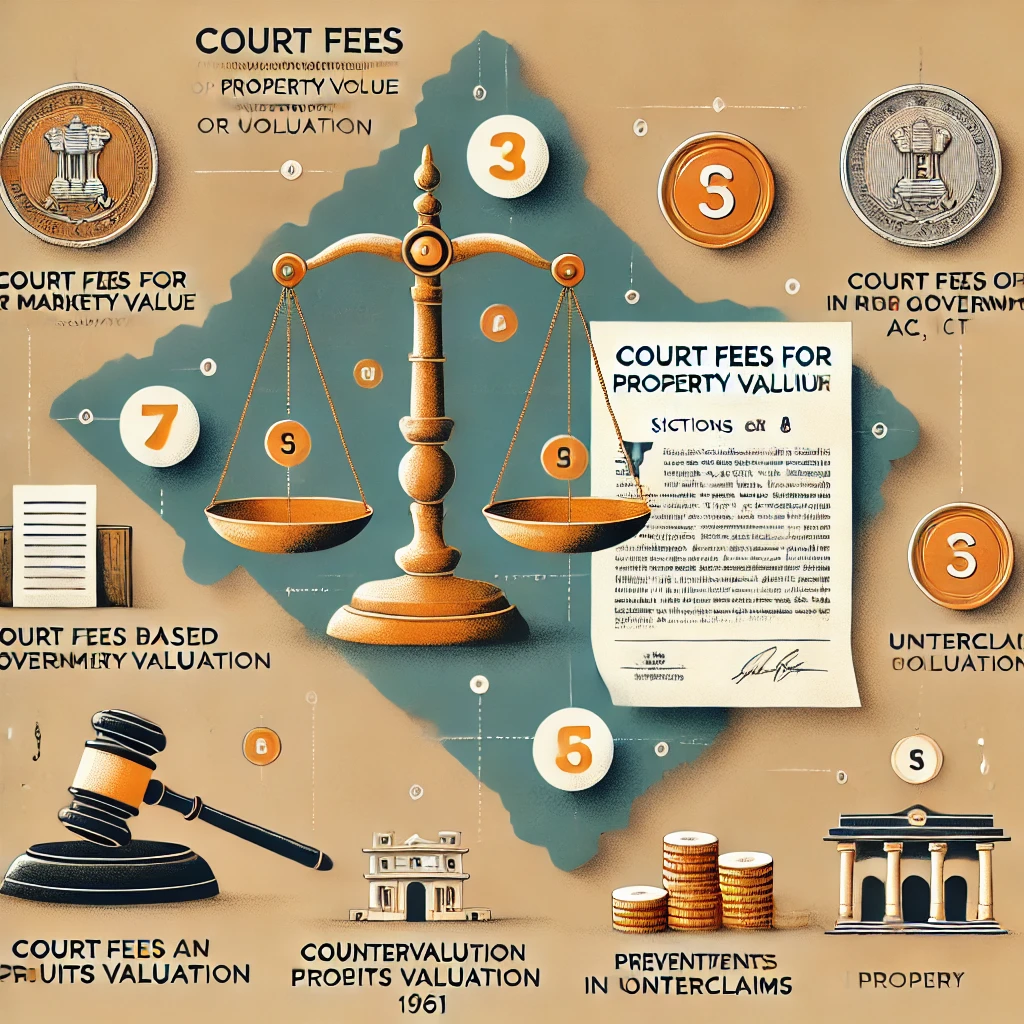
Court Fees for Property Value and Counterclaims: Sections 7 and 8 of the Rajasthan Court Fees and Suits Valuation Act, 1961
Section 7: Determining the Market Value of Property
When a court fee depends on the market value of a property, the value is calculated based on the date when the lawsuit is filed. This ensures that the court fee reflects the latest worth of the property, rather than an outdated valuation.
For certain types of cases mentioned in the Act, special rules apply to determine the market value of land. If the land has a settled rent, its value is taken as twenty-five times the last sanctioned rent rate. If the land does not have a settled rent, the market value is determined based on the rent rate of similar land in the same area during the last settlement.
For example, if a farmer files a case involving agricultural land and the rent rate fixed for the land in the last settlement was ₹2,000 per year, the court will consider the market value as ₹50,000 (₹2,000 × 25). If no rent was fixed, but nearby similar land had a sanctioned rent rate of ₹3,000 per year, the market value for court fee purposes will be ₹75,000 (₹3,000 × 25).
For More Updates & Regular Notes Join Our Whats App Group (https://chat.whatsapp.com/DkucckgAEJbCtXwXr2yIt0) and Telegram Group ( https://t.me/legalmaestroeducators ) contact@legalmaestros.com.
This method ensures uniformity in assessing land value and prevents disputes about overvaluation or undervaluation in legal matters.
For More Updates & Regular Notes Join Our Whats App Group (https://chat.whatsapp.com/DkucckgAEJbCtXwXr2yIt0) and Telegram Group ( https://t.me/legalmaestroeducators )
Section 8: Court Fees for Set-Offs and Counterclaims
When a defendant responds to a lawsuit with a set-off or a counterclaim, they must pay a court fee just like the plaintiff does when filing a case. A set-off happens when the defendant claims that the plaintiff also owes them money, reducing the amount the plaintiff can recover. A counterclaim is when the defendant not only defends against the case but also files their own claim against the plaintiff.
For example, if a shopkeeper sues a supplier for failing to deliver goods worth ₹1 lakh, but the supplier claims that the shopkeeper has not paid ₹40,000 for a previous order, the supplier’s claim is a set-off and requires a court fee. Similarly, if a builder sues a homeowner for non-payment of ₹5 lakh for construction work, and the homeowner countersues for ₹2 lakh, claiming poor construction quality, the homeowner must pay a court fee on their counterclaim.
The rule ensures fairness by making sure that both parties in a dispute contribute to the court fee system when making financial claims. It prevents misuse of set-offs and counterclaims as a way to avoid paying court fees while still seeking legal benefits.
Conclusion
Sections 7 and 8 of the Rajasthan Court Fees and Suits Valuation Act, 1961, provide clear guidelines on how court fees should be charged in cases involving property value and counterclaims. The law ensures that market value is assessed consistently and fairly, preventing manipulation in land-related disputes. It also ensures that defendants who file counterclaims or set-offs pay appropriate court fees, maintaining a balance between plaintiffs and defendants in legal proceedings. These provisions help in making the court fee structure transparent and just for all parties involved.






